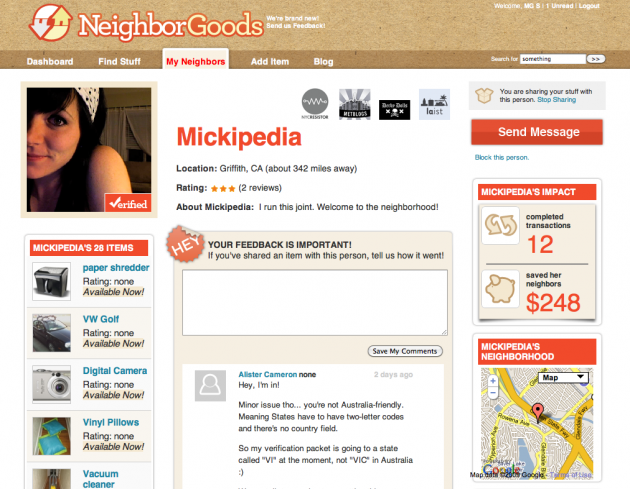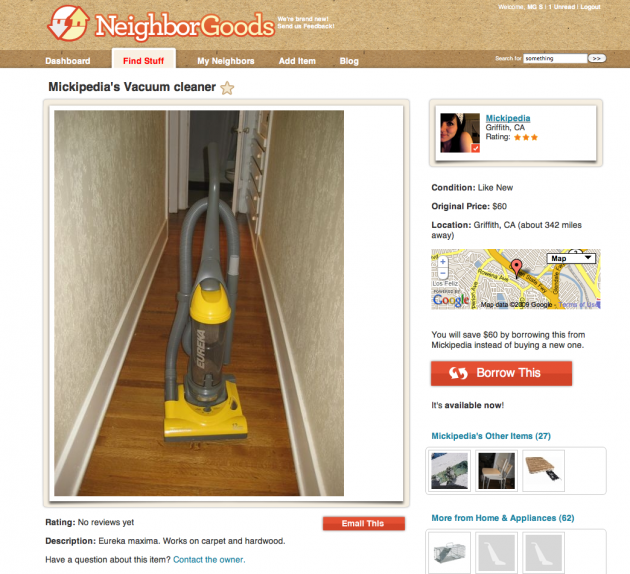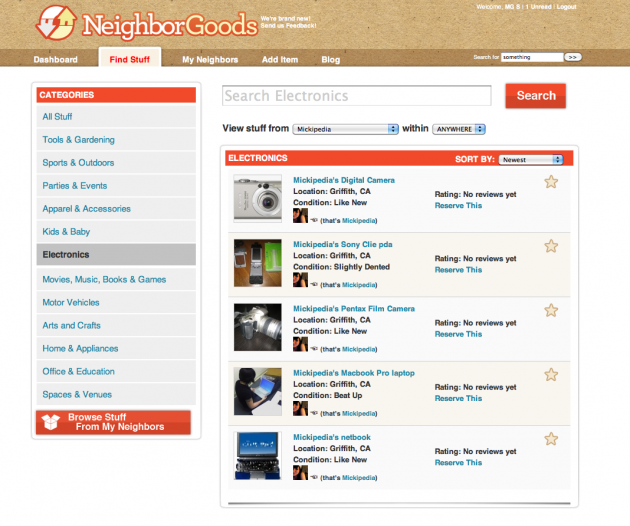 Everyone loves to share stuff on the web (I just want to do it faster), but a potentially more compelling business model is using the web to share physical stuff. That’s the idea behind NeighborGoods, a new service launching its public beta program in Los Angeles today.
Everyone loves to share stuff on the web (I just want to do it faster), but a potentially more compelling business model is using the web to share physical stuff. That’s the idea behind NeighborGoods, a new service launching its public beta program in Los Angeles today.
I’ve had a chance to look around the service for a few weeks, and the idea seems like a very solid one. Here’s a perfect use case: I don’t have a vacuum cleaner, but someone I know does, and they’re sharing it on NeighborGoods, and it’s available, why not just borrow it? You simply click a button, fill out a pick up date and time, a return date and time, and then send the sharing request. If the person who owns the vacuum approves, you’re all set.
So, how do you stop shady people from stealing your stuff? Well a core idea behind NeighborGoods is to offer “Verified neighbors.” Basically, you send NeighborGoods your address and they mail (as in physically mail, not email) a special code to you there. Once you are verified at that address, you will have a special red check box over your avatar, so people know that you can be held accountable if you borrow something.
There is also a star rating system (out of 3 stars) to show how good of a sharer a person is. And of course, there is a text feedback channel on every profile page for users to express their pleasure or displeasure with that person.
Locality is obviously one of the key aspects of NeighborGoods as well. This is not Craigslist or eBay where you can ship stuff anywhere you want. The idea here is that you will be borrowing with people who are in your city (hence the pick up and drop off times). And that’s why NeighborGoods is only opening to people with Los Angeles zip codes today, this will be the first public trial of the system. If all goes well, the plan is to roll out to a bunch of other cities, founder Micki Krimmel tells us.

Another interesting aspect to NeighborGoods is that you are asked to state the value of the item you are sharing. That way, when someone borrows that item from you, it is added to your profile showing that you’ve saved your neighbors X amount of dollars.
And speaking of money, the real key to all of this is to build a business. Though the service will start out entirely free to build a user base, the plan is to eventually charge a small yearly fee to users who find the service most useful. That is to say that while some aspects of it will always remain free, people who share a lot will be asked to give a little back to the site in return.
That’s why showing the prices of the items you borrowed is a good idea. Borrowing that vacuum would have saved me $60 versus if I had to buy one. So already it seems worth it for me to pay a yearly fee to NeighborGoods to get access to their sharing data. Exact pricing details haven’t been set yet, but there will likely be different tiers based on the amount of goods you are using the site for, Krimmel says.
There will also be the option to sell your stuff through NeighborGoods, rather then just loan it out.
All items listed on the site are grouped into categories to help you navigate what you are looking for. Of course, there is search functionality too. And if there is something you want that’s not yet listed, you can add it to your wishlist for your contacts to see.
Services based around locality are hot right now from a monetization stand point, not only for the potentially advertising, but for ideas like this. Rather than offering up a service that is entirely based online, this is all about tangible goods and services.
Krimmel raised a small amount of seed money from a former client she used to work with to get the site off the ground with the help of Austin, TX-based development company XOXCO. As it grows, she’s likely to look for more to help with expansion.

